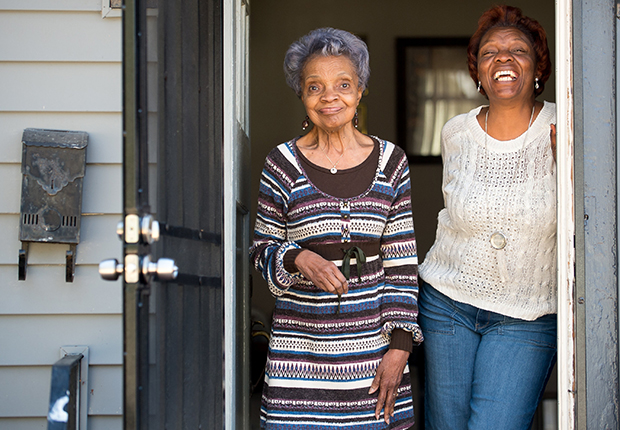AARP Hearing Center

By Ann Hardie
Twenty-three years ago, Cynthia Allen said, she contracted HIV from her then-husband. Soon after that, her mother, Margaret, became very sick with pneumonia.
“At the time, I was suicidal,” Allen said. She was dealing with the double shock of the diagnosis and her marriage ending. Based on her experience, Allen asked doctors to run an HIV test on her mother. She said she believes it saved her mother’s life and gave her own life new purpose.
“After my mom tested positive, it was not just about me anymore,” she said. “I began to think that I needed to be around to help her get through it.”
In her Atlanta home, Allen, 50, now helps care for her mother, 75. She also helps educate others about the virus, participating in a public service campaign with the U.S. Centers for Disease Control and Prevention and speaking at senior centers.
Georgia had 46,870 residents living with HIV as of 2014, the fifth highest number of cases in the nation, according to the CDC.
“A lot of people feel that people 50 and older are not having sex, but a lot of older people are sexually involved,” Allen said. “That’s the reason there needs to be a lot more education for older people around HIV and AIDS.”
AARP Georgia is joining forces with advocacy groups. AARP’s main contribution is providing resources for caregivers who either have the virus or are taking care of people with HIV or AIDS.
“Anytime you take someone to the doctor or take someone something to eat, you are a caregiver,” said Alice Bennett, AARP associate state director for community outreach. “We want people to understand the resources we have.”
For more on those resources, go to aarp.org/caregiving.
Opening up about the virus
Some of the issues concerning care for people with HIV or AIDS are the same as those for the older population in general—isolation, transportation, taking proper medication.
One big challenge, Bennett said, is getting people with HIV to open up about their condition. That’s why AARP Georgia is participating in HIV/AIDS awareness days aimed at women and girls, African Americans and other groups.
“HIV is still a very sensitive subject,” Bennett added. “You have to know how to have the conversation about it.”
It took Allen years to go public. She started going to therapy and to a support group to fight her depression. “I was still being secretive. One day I woke up and prayed that God would give me the strength to put a face to HIV,” Allen said. “If breast cancer can have a face, if hepatitis can have a face, if lupus can have a face, why can’t HIV have a face?”
Advances in treatments have been lifesavers for Allen and her mother. They both take one pill a day to keep the virus in check. Allen did have a bout of pneumonia in 2014 and spent two weeks in the hospital. Her grown sons stepped in to help care for their grandmother, who has early-stage dementia and glaucoma.
Allen is amazed and grateful that she and her mother are alive two decades after being diagnosed. That’s why she encourages the people she meets at senior centers to talk with their doctors about HIV.
“Some doctors may not think that seniors are sexually active when they are,” Allen said. “I tell them to be sure to specifically tell their doctors, ‘I want an HIV test.’ ”
Ann Hardie is a writer living in Atlanta.































































